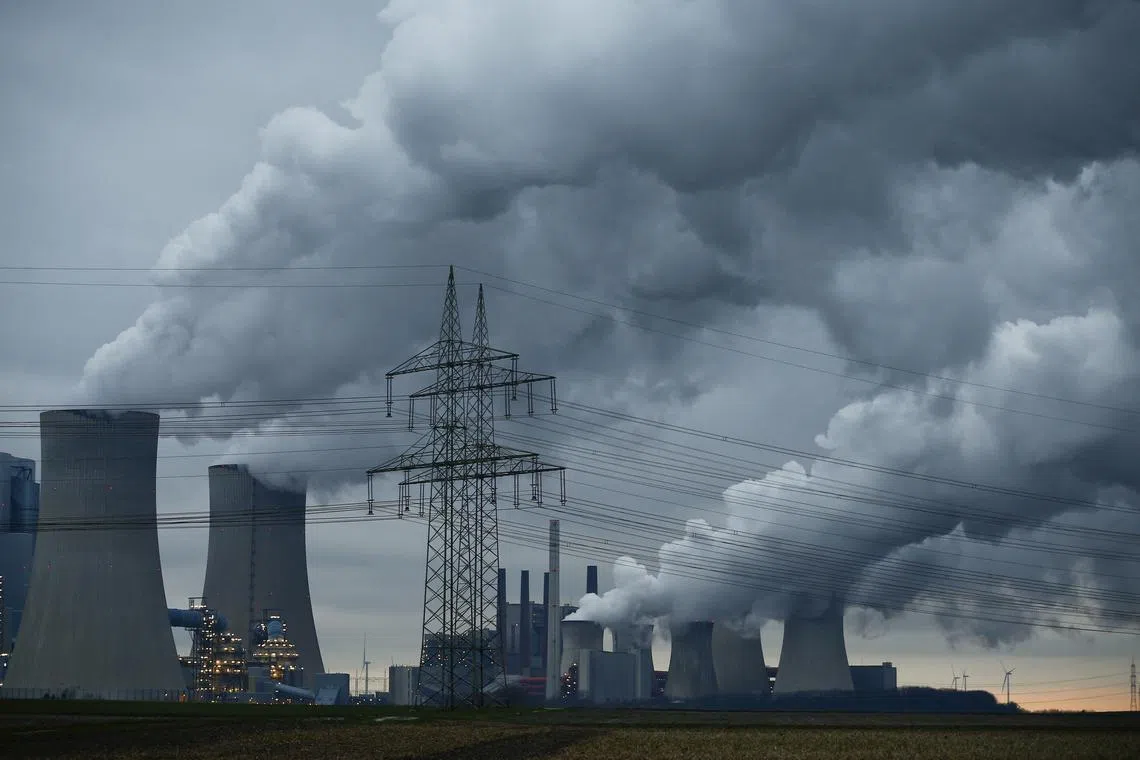UN report card on world’s progress to limit warming to 1.5 deg C will be bleak: Politicians
Sign up now: Get ST's newsletters delivered to your inbox

To meet climate targets, renewable energy generation must triple every year from now till 2030, said the director of the International Renewable Energy Agency.
PHOTO: REUTERS
Follow topic:
ABU DHABI - The much-awaited United Nations report card on how the world has fared in limiting global warming to 1.5 deg C is expected to show bleak results, said politicians and climate change envoys on Saturday.
The first global stocktake of climate actions is a key component of the year-end COP28 United Nations climate talks
“We don’t need to wait until the global stocktake to know just how much work there is ahead of us,” said Dr Sultan Ahmed Al Jaber, designated president of COP28,
At the event’s ministerial plenary on accelerating renewable energy sources, United States Special Presidential Envoy for Climate John Kerry added: “Theoretically, yes, we can (meet the 1.5 deg C target), but there is nothing in current activities in countries around the world, mine included, that indicates that we are prepared to do what we need to do to keep at 1.5 deg C.”
The transition to renewable energy sources and the phasing out of coal are key to driving down emissions. But while the shift has started, it must be ratcheted up with funding for developing nations, said key speakers at the assembly.
Dr Al Jaber, who also heads UAE’s state-owned oil company and is the Emirates’ climate envoy, noted that in 2022, renewables accounted for 81 per cent of all new energy capacity installed.
But to meet climate targets, renewable energy generation must triple every year from now till 2030, said Irena director-general Francesco La Camera.
Mr Kerry said more private-sector money should be channelled to less-developed countries
“No government in the world has enough money to do what we need to do. We’re talking about trillions. Who has the trillions? The private sector,” he said.
“We need to be exciting that private sector money to begin the move to bankable deals, to bring clean development to parts of the world left out... Countries in sub-Saharan Africa deserve to be able to develop.”
Meanwhile, Tonga – a chain of small islands in the Pacific and among the most vulnerable in the climate crisis – has long been frustrated with the lack of access to financing from global facilities, said its prime minister Siaosi Sovaleni, who spoke at the Irena forum.
Instead, it is now working with the private sector and its neighbours in the South Pacific to fulfil its 2025 ambition of generating 70 per cent of its electricity from renewables.
Mr Sovaleni added: “We are small island developing states, but we are also big ocean states. We need to invest more in ocean technology. It will be hard for us to keep placing solar panels on land.”
In a recorded address to the assembly, UN secretary-general Antonio Guterres called for the removal of intellectual property barriers on the sharing of key renewable energy technologies including energy storage, so that they can be treated as global public goods.
Work on the first global stocktake started in November 2021 at the COP26 UN climate talks in Glasgow, with the collection of information from scientific studies, countries’ climate pledges and transparency reports, among others.
The process is now at its second stage, with a series of technical dialogues under way to assess the information gathered. The final phase of the stocktake will happen during COP28 in Dubai in November, with high-level discussions on the second-stage findings. This will culminate in key political messages to strengthen climate action to meet the Paris Agreement goals.
This global stocktake will be repeated every five years, as mandated under the Paris Agreement.
Mr Simon Stiell, executive secretary of the UN Framework Convention on Climate Change, said: “The global stocktake will enable us to look at every sector, every region, to give political and technical directions, and this is far more than just another input into our NDCs (nationally determined contributions, or each nation’s climate pledges). It should be more than bold statements but specific policies (and) interventions for that course correction.”


